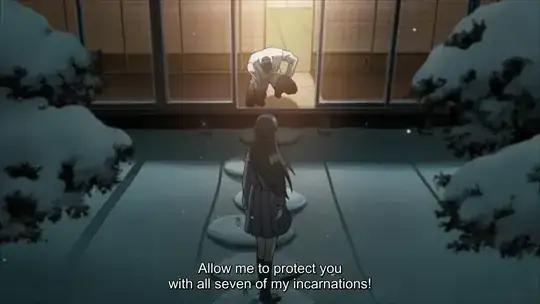There are a few distinct mentions of cases of the Seven Incarnations, which are each plausible in their own rite.
Notable mentions of incarnations
Incarnations of Immortality
The Incarnations of Immortality is a series in which seven books each focus on a single incarnation, a mortal which becomes the personification of Death, Time, Fate, War, Nature, Evil, or Good. Most people feel the effects caused by one or more of these incarnations. So, Black Lagoon may be referring to how Ginji is affected or composed of each of these seven things; he could be more or less saying, "Please allow me to protect you with my entire being."
Vishnu's incarnations
The second possibility is a reference to Vishnu Purana, a religious Hindu text. According to legend, Vishnu created incarnations of himself to eradicate evil and balance the world. Vishnu Purana states that there are seven such incarnations1:
Vishnu Purana says that there were seven incarnations of Vishnu including Yajna, Ajit, Satya, Hari, Manas, Vaikuntha, and Vamana.
— Mythology of Vishnu and His Incarnations, pp. 44–45
These incarnations allow him to become Supreme God2. Thus, Ginji may be stating that he will use any power (the incarnations) available to him to protect Yukio.
However, based on how Ginji phrases this in the manga, these two possibilities seem unlikely.
!["[I request] to protect you for the entirety of [my] life."](../../images/4075293979.webp)
(Black Lagoon, chapter 27, pp. 17)
Buddhist incarnations
One of Buddhism's more significant points is their concept of reincarnation, or rebirth. In Buddhism, as you are born and reborn, you fulfill a cycle known as the "Cycle of Life". However, you must be born seven times (in any form) to achieve moksha, a liberation from this cycle (which eventually leads to the ultimate peace: nirvana).
Calm and unmoved the Pilgrim glideth up the stream that to Nirvâna leads. He knoweth that the more his feet will bleed, the whiter will himself be washed. He knoweth well that after seven short and fleeting births Nirvâna will be his....
— The Voice of the Silence, pp. 69
As you can can conclude, this cycle involves going through seven incarnations, each of the births that you endure, before achieving nirvana. In some forms of Buddhism, these components are believed to be partial aggregates of your consciousness, thus could be considered a large portion of your "whole" being.
What makes this the most plausible explanation is that Ginji is a member of the Yakuza. Many Yakuza are focused around the ways of the samurai and their teachings. In Japanese history, samurai were largely centered around Zen, a form of Buddhism3.
Putting this Zen relationship in context with the manga, which states that Ginji will "protect [her] for the entirety of his life", we can conclude that Ginji intends to spend all seven of his rebirths protecting Yukio.
Footnotes
1 Wikipedia has an extensive list, but according to the Vishnu Purana, only seven of these avatars truly exist.
2 Further reading: Vishnu, Wikipedia
3 Further reading: The Religion of the Samurai

!["[I request] to protect you for the entirety of [my] life."](../../images/4075293979.webp)